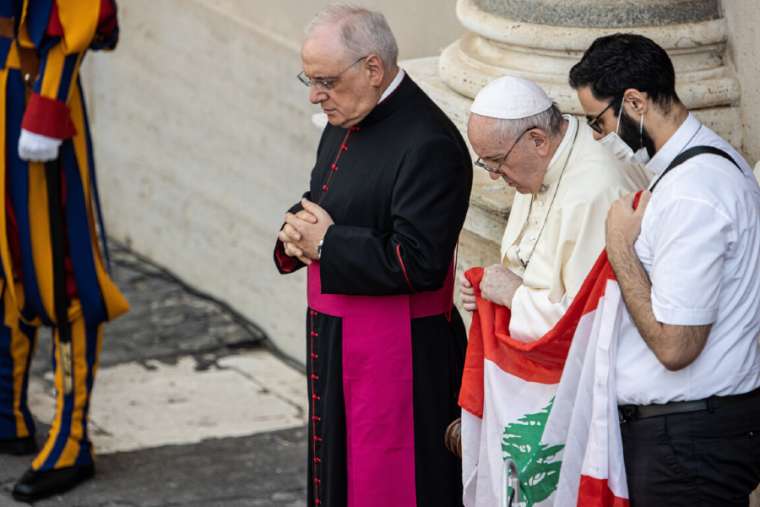Pope Francis holds the flag of Lebanon and prays during his general audience on Sept. 2, 2020. Credit: Daniel Ibanez/CNA.
Pope Francis has written a Christmas letter to the people of Lebanon encouraging them to trust in God during times of crisis.
“Beloved sons and daughters of Lebanon, I am deeply troubled to see the suffering and anguish that has sapped the native resilience and resourcefulness of the Land of the Cedars,” Pope Francis wrote in the letter published today.
“On this Christmas Day, however, ‘the people who walked in darkness have seen a great light’ — the light that lessens our fears and instils in each of us the sure hope that God’s Providence will never abandon Lebanon and will turn this time of sadness to good,” he wrote.
Lebanon has faced an economic and political crisis in 2020 which was exacerbated by a devastating explosion in Beirut’s port on 4 August. The blast killed nearly 200 people, injured 600 others, and caused more than $4 billion dollars in damage.
Cardinal Bechara Boutros Rai, the leader of Lebanon’s Maronite Catholics, said last month that the country’s instability has “caused a bitter economic crisis, which increased the poverty rate and caused the exodus of population.”
In Pope Francis’ letter sent to Cardinal Rai, the pope expressed his “affection for the beloved people of Lebanon,” adding that he hopes to visit the country as soon as possible.
The pope appealed to the international community to “help Lebanon stand apart from conflicts and regional tensions.”
He said it is “painful” for him to see Lebanon “deprived of [its] precious aspirations to live in peace and to continue being, for our time and our world, a message of freedom and a witness to harmonious coexistence.”
“Let us help Lebanon to stand apart from conflicts and regional tensions. Let us help Lebanon to surmount this grave crisis and resume a normal existence,” Pope Francis wrote in his appeal.
More than half of Lebanon’s population lives in poverty, according to the United Nations’ Economic and Social Commission for Western Asia, and tens of thousands of Lebanese people have lost their jobs as a result of the explosion.
Pope Francis called on Lebanon’s political leaders to use their responsibility to seek the best interest of the public rather than personal gain.
The pope also issued a special Christmas message for South Sudan together with the Archbishop of Canterbury Justin Welby and Rev. Martin Fair, the moderator of the Scottish Presbyterian Church, as he did last year on Christmas.
The message to South Sudan’s political leaders reiterated a firm commitment to bringing peace to the country and the desire of the religious leaders to visit South Sudan together.
“We pray, this Christmas, that you will know greater trust among yourselves and a greater generosity of service to your people. We pray you know the peace that surpasses understanding in your own hearts and in the heart of your great nation,” the message states.
In his letter to the Lebanese people, Pope Francis encouraged Maronite Catholics to remember that Christ’s birth means God is with us and to “trust in his presence and his faithfulness.”
“Lebanon is mentioned frequently in sacred Scripture, yet surely one image of the Psalmist stands out: ‘The righteous shall flourish like the palm tree, and grow like a cedar of Lebanon,’” he wrote.
“In the Bible, the majestic cedar symbolizes steadfastness, stability and protection. The cedar symbolizes the righteous who are deeply rooted in the Lord, a sign of beauty and prosperity, standing tall and bearing abundant fruit even in old age.”
“Like the cedar, draw deeply from the roots of your life in common, so that you may once more be a people of fraternal solidarity. Like the cedar that withstands every storm, may you make the most of present events in order to rediscover your identity, which is to bring to the whole world the sweet fragrance of mutual respect, coexistence and pluralism,” Pope Francis said.
“Yours is the identity of a people which does not abandon its homes and its heritage, the identity of a people which refuses to renounce the dream of those who believed in the future of a beautiful and prosperous country.”
Source: CNA

